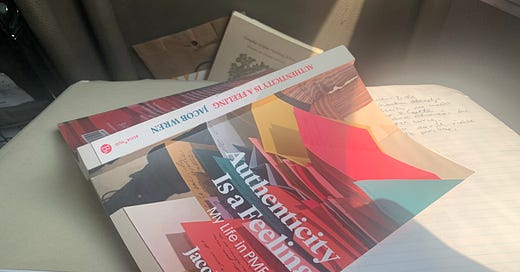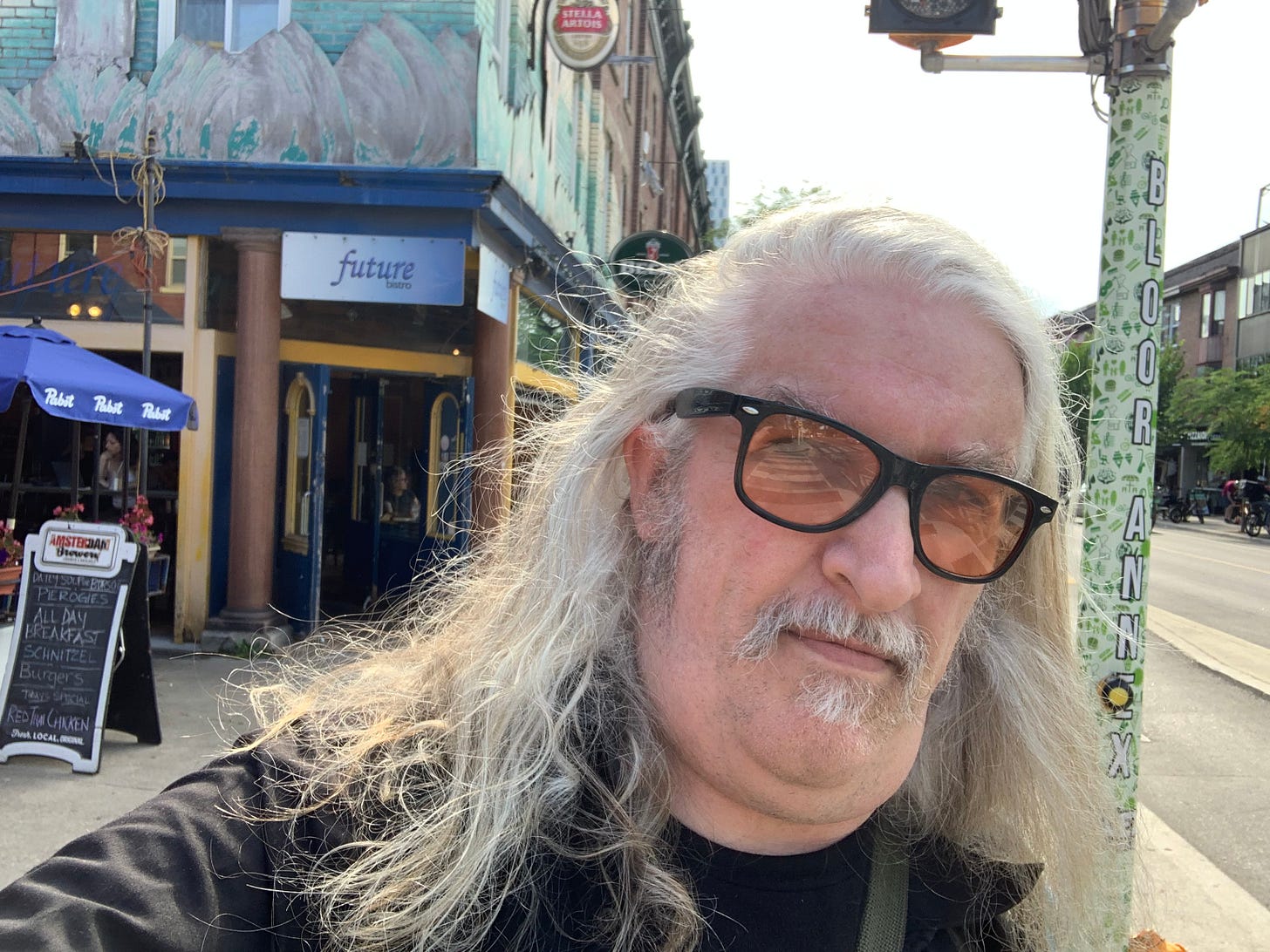the green notebook
, reading Jacob Wren + Samuel Ace en route to Toronto, + the new Leonard Cohen biography,
Today’s VIA train to Toronto provides one of the newer models, comparable to what we rode across England, from London, south to West Sussex.
I’m intrigued by Jacob Wren’s memoir, Authenticity Is a Feeling: My Life in PME-ART (2018), composed as a combination of criticism, first-person reportage and archive, surrounding the first two decades of his participation in a collaborative theatre collective in Montreal he helped found. Moving from storytelling, lingering doubt, alternate voices and blistering self-critique, he writes: “I have always been interested in what it means to stand in front of a room full of people, often strangers, who are watching you, and to do so with as little armouring as possible, not hiding the fact that the situation is potentially unnerving or even nerve-racking, being as vulnerable as possible without turning vulnerability into any kind of drama or crutch. I often say that I personally find performing to be humiliating, and do my best, while performing, not to conceal this aspect of my experience. I often wonder why I have spent the past thirty years of my life obsessively working on this particular question and practice. Perhaps it is only because it is a kind of impossible undertaking, always leaving me artistically destabilized and therefore always leaving me wanting more.”
I spent my twenties abiding by open sets, attending those early attempts to read my poems aloud to literary audiences, attempting to participate in as many as possible. Michael Dennis told me a good reader sells more books than a bad reader. Franco-Ontarien playwright Patrick Leroux suggested I practice reading in front of a mirror. The public performance of writing is experience as much as anything else: riding comfort, compatibility. Seeing what works.
*
On the train, once more, into Toronto.
Samuel Ace, I want to start by saying (2024): “I want to start by saying that the intentions are always waiting.”
Once more, Lake Ontario blue. As the train shoots through Cobourg, I wave in the direction of writer Stuart Ross, whom I will someday visit, when along this route. When next I drive, perhaps, our small car touring. There is always some chaos, some consternation, that prevents us the pause.
From the train window, facing north: the backsides of houses, the church. What everyone keeps from the view of the road.
The compact, rural community of Marysville, Hastings County. The blue of their sky.
*
Jacob Wren, further to the introduction to his memoir: “I have been making performances and literature for almost thirty years and, despite or perhaps because of my incessant doubts, I apparently have not quit. I constantly wonder what keeps me going. In one sense I feel that when you’re an artist the only way to keep going is to believe you have no choice. Believing one has no choice is also a form of privilege.” I mean, I’ve had frustration, but rarely doubt. Okay, that might not be entirely true. There is often doubt.
Wren writes of doubt, but in the end, this is a book about authenticity: seeking and honing while simultaneously imagining it might be the artists’ own version of the unicorn. Might it even exist? “My performance work has been a search for authenticity, but I don’t think authenticity is something that exists. A work of art cannot be authentic, it can only feel authentic for certain people at certain times. Which is to say that, for me, authenticity is a feeling and about what we feel. In much the same way one might feel sad or feel joy, one can feel something to be authentic.”
*
I drop my bags in my University of Toronto dorm room. Is this how students live? A desk, a bed, a dresser. I unpack bag, laptop, etcetera. Open browsers for email and other notifications. Shouldn’t I be writing?
Leonard Cohen composed the poem “EDMONTON, ALBERTA, DECEMBER, 1966, 4 A.M.” during his first visit to the city, staying in “this small hotel on Jasper / Street.” He was thirty-two years old, and his debut novel, Beautiful Losers (1966), was still fresh in the air. He was scheduled for a reading at the University of Alberta Tory building, which saw some five hundred attendees, and remained in the city for five weeks. This was the same visit that saw the Hotel Macdonald overwhelmed by fans and admirers, Cohen’s “high spirited parties” that prompted the establishment to jettison the Montreal poet, for their own protection. University of Alberta undergrads “Barbara and Elaine” (or “Barbara or Lorraine,” according to another version) provided Cohen the hospitality of their basement, or a fresh hotel, or the safety of their couch, inspiring him to compose his “Sisters of Mercy.” As graceful, he offered, and green as a stem.
Toronto, here. As one might ask, via Cohen: “When did I stop writing you?”
*
Does anyone write poems for or within Future Bistro anymore? The former Future Bakery on Bloor West, a business that no longer includes a bakery. I try to land here every time I’m in town: Caesar salad, mashed potatoes with gravy, borscht. I’ve been writing here since the 1990s, have seen the ebbs and flow of changes, from where New York-based poet Adeena Karasick knew to catch the last Annex payphones, to further encounters over the years with Toronto writer Cary Fagan, UK-based Peter Jaeger, Toronto writer Leon Rooke, Prince George writer Laisha Rosnau. Where poet Steve Venright might pick up the day-old bread. A meeting-place, not far from the University of Toronto. A student hang-out. Did you know that Toronto poet Michael Holmes produced a chapbook about the Future Bakery back in the 90s? Satellite Dishes from the Future Bakery (1998). I still have my copy.
The word bistro said to originate from northern France, whether related to bistouille, a colloquial term meaning “cheap liquor,” bistraud, meaning “little servant,” or bistro, meaning “innkeeper.” Does anyone know? Apocryphal tales suggest the word emerged from the Russian bystro, for “rapidly,” co-opted by the locals during the Russian occupation of Paris in 1814, following the Battle of Paris. A word the Russian soldiers would shout at café staff, although this has been disputed. The Future quickly. The future, from whence Napoleon would be sent into exile.
I will repeat you, endlessly. A sparrow, returns to the café floor.
*
My university residence, silent. Well after midnight, I seek the washroom down the third floor hall without a body in sight. Am I the new caretaker? Have I been dead this whole time?






I was so lucky to meet Stuart in Banff! He's a gem. :)